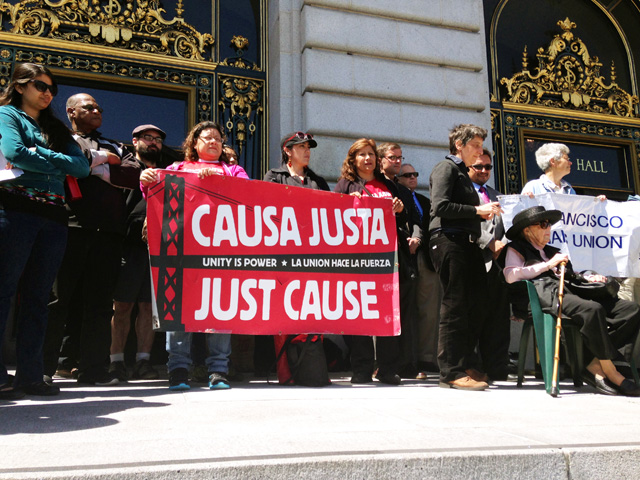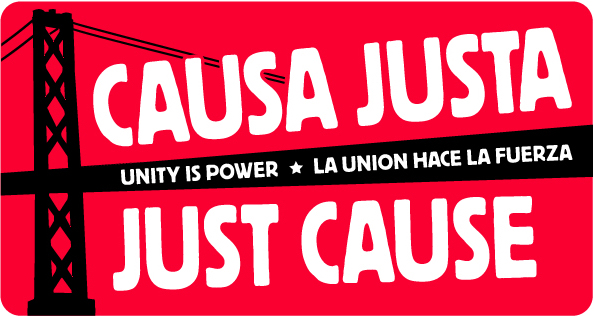
Supporters, join us on the steps of SF City Hall on Monday, April 22 @ noon for a speak out by tenants facing eviction and displacement, and then on to the 2nd Land Use committee hearing for an amended condo conversion measure (the Chiu-Yee alternative) which would curb speculation and protect tenants from evictions.
(español sigue)
Our families and long-time residents are being forced into garages, overcrowded SROs, or completely out of the city. We have to do as much as possible to offer them protections.
Under an earlier and uglier version sponsored by Sup. Mark Farrell, apartments converted from rentals to “Tenancies In Common (TICs)” would be allowed to bypass the city’s annual cap on condo conversions by paying a fee. Tenant advocates say that the original legislation would lead to many thousands more evictions, because it sends a strong signal to real estate speculators that the city will no longer have meaningful restrictions on the number of condo conversions.
Community, labor, and environmental organizations criticize the Farrell plan for undermining long-standing protections of rent controlled housing in San Francisco. So stand with us on Monday, April 22 on the steps of city hall and then the Land Use Hearing and make YOUR voice heard. Let the SF Board of Supervisors know you’re watching them.
The legislation is an alternative to the Condo Conversion legislation, sponsored by Supervisor Mark Farell that has been pending for months before the Board. Under the Farrell plan, apartments that have been converted from rentals to “Tenancies In Common (TICs)” would be allowed to bypass the city’s annual cap on condo conversions by paying a fee.
The Farrell proposal has been criticized by community, labor, and environmental organizations for undermining long-standing protections of rent controlled housing in San Francisco. Tenant advocates say that the original legislation would lead to many thousands more evictions, because it sends a strong signal to real estate speculators that the city will no longer have meaningful restrictions on the number of condo conversions.
After failing to negotiate a compromise, President Chiu and Supervisor Norman Yee developed this alternative proposal. “This legislation will create a bridge between TiC owners who will be able to refinance their mortgages through the conversion to condo, and the cities rent-controlled tenants who need protections from real estate speculation. The alternative addresses people’s need without further rewarding the real estate industry that created the failed TiC model while evicting thousands of tenants,” says Maria Zamudio, CJJC San Francisco Housing Organizer.
Why we support the Chiu-Yee alternative:
-
The proposal will suspend future conversions and reduce the incentives for speculation. Speculators are now in the process of evicting hundreds of existing tenants to sell off apartments as Tenancies-in-Common (TICs) — assuring unsuspecting buyers that the city will allow their units to be converted in the future. We need to show that assumption is unsustainable and unacceptable.
-
The City must keep its overall ceiling on condominium conversions: limiting conversions to 2000 units in a decade. Thus we need a minimum ten-year moratorium on conversions if the existing TIC owners are allowed to convert early. We need a longer period if more than two thousand existing TICs are allowed to convert. The Chiu-Yee alternative builds in these limits.
-
After the moratorium on conversions, future conversions should be limited to discourage another build-up of TIC owners who were encouraged by unrealistic expectations that the city will allow them all convert. The Chiu-Yee proposal would lower the maximum size of building eligible to convert in the future from 6 units to 4 unit buildings and assist owners who will actually live in their units.
-
The proposal moves to stop fraud in the conversion process by strengthening standards and creating an opportunity for the public to review potential conversions before they are approved.
While the Chiu-Yee alternative does allow existing TIC owners to convert earlier than existing law allows, by imposing a moratorium on future conversions alternative decreases the incentives for speculators to evict tenants today and it changes the rules of the game for the future. The Chiu-Yee alternative is a critical step towards easing today’s housing crisis.
“But it does not solve their problem at the expense of renters. Instead, it puts into place firm restrictions on converting to condominiums in the future, so that the real estate industry will not see this as a an opportunity to profit from evictions of long time renters.”
Español
La legislación es una alternativa a la legislación de Conversión a Condominios patrocinada por el supervisor Mark Farell que ha estado pendiente ante la mesa de supervisores por meses. Bajo el plan de Farrell, apartamentos que han sido convertidos de alquileres a “Tenancies in Common (TIC’s)” serian permitidos a pasar por alto tope anual de conversiones a condominios al pagar una tarifa.
Organizaciones comunitarias, de labor, y ambientales critican el plan de Farrell por minar las protecciones larga data que tiene la vivienda bajo control de renta en San Francisco. Defensores de los inquilinos dicen que la legislación original resultaría en muchos miles de desalojos mas, porque enviaría una fuerte señal a los especuladores de bienes raíces que la ciudad ya no tendrá restricciones significativas en el número de conversiones de condominios.
Despues de no poder negociar un compromiso, el Presidente Chiu y Supervisor Norman Yee desarrollaron esta propuesta alternativa.
“Esta legislación tiene la habilidad de crear un puente entre lo que necesita los dueños de los TiC que van a poder refinanciar sus hipotecas al convertir a condominio, y los inquilinos bajo control de renta en nuestra ciudad que necesitan protecciones en contra de la especulación de propiedades. La alternativa toma en cuenta la necesidad de la gente sin recompensar aun mas la industria de bienes y raíces que crearon este modelo de TiC fallido mientras que desalojaron a miles de inquilinos.” dijo Maria Zamudio, de Causa Justa :: Just Cause.
Porque apoyamos la alternativa Chiu-Yee:
—La propuesta suspenderá futuras conversiones y reducirá los incentivos para la especulación. Los especuladores están ahora en el proceso de desalojar a cientos de inquilinos existentes para vender apartamentos como Tenancies in Common (TICs), por asegurarles a compradores desprevenidos que la ciudad va a permitir que sus unidades sean convertidas muy pronto.. Tenemos que demostrar que esta suposición es insostenible e inaceptable.
—The City must keep its overall ceiling on condominium conversions: limiting conversions to 2000 units in a decade. Thus we need a minimum ten-year moratorium on conversions if the existing TIC owners are allowed to convert early. We need a longer period if more than two thousand existing TICs are allowed to convert. The Chiu-Yee alternative builds in these limits.
—La Ciudad tiene que mantener su limite de conversiones totales: limitar las conversiones a 2000 unidades en una década. por lo tanto, necesitamos un moratorio de conversiones de por lo menos diez anos si los propietarios de TIC existententes pueden convertir temprano. Si mas de 2000 TIC son convertidos, necesitaríamos alargar el periodo del moratorio. La alternativa-Yee Chiu se basa en estos límites.
—After the moratorium on conversions, future conversions should be limited to discourage another build-up of TIC owners who were encouraged by unrealistic expectations that the city will allow them all convert. The Chiu-Yee proposal would lower the maximum size of building eligible to convert in the future from 6 units to 4 unit buildings and assist owners who will actually live in their units.
—Después del moratorio de conversiones, conversiones en el futuro deben ser limitadas para desanimar otra acumulación de propietarios TIC que fueron estimulados a comprar con expectativas poco realistas que la ciudad les va a permitir convertir. La propuesta Chiu-Yee reduciría el tamaño máximo de edificios que van a ser elegibles para convertir en el futuro de 6 unidades ha edificios de 4 unidad y ayudar a los propietarios que realmente vivirán en sus unidades.
—La propuesta pasa a detener el fraude en el proceso de conversión mediante el fortalecimiento los estándares y crear una oportunidad para que el público revise conversiones posibles antes de su aprobación.
—Mientras que la alternativa Chiu-Yee deja que los existentes propietarios de TIC conviertan antes de lo que la ley existente permite, mediante la imposición de un moratorio sobre futuras conversiones la alternativa reduce los incentivos que especuladores tienen para desalojar a inquilinos y cambia las reglas del juego para el futuro. La alternativa Chiu-Yee es un paso crítico para aliviar la crisis de vivienda actual.
“Pero esto no resuelve su problema al costo de los inquilinos. En vez, pone en practica restricciones firmes sobre la conversión a condominios en el futuro, para que la industria de bienes y raíces no vea esto como una oportunidad de beneficiarse de los desalojos de inquilinos de largo tiempo

